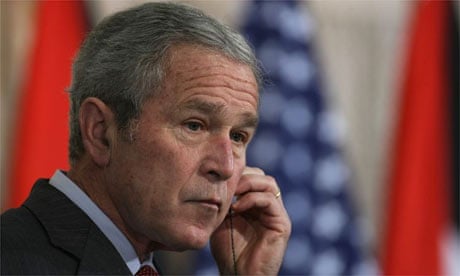George Bush this morning said he "strongly supported" Ukraine's attempt to join Nato, and warned he would not allow Russia to veto its membership bid.
Speaking in Kiev after a meeting with Ukraine's president, Viktor Yushchenko, the US president said both post-Soviet Ukraine and Georgia should be allowed to join the alliance – despite vehement objections from Russia.
In remarks likely to infuriate the Kremlin, Bush said Ukraine should be invited during this week's Nato summit in Bucharest to join Nato's membership action programme, a prelude to full membership.
He also said that there could be no deal with Moscow over the US administration's contentious plans to locate elements of its controversial missile defence system in eastern Europe.
"This is a misperception," Bush said after talks with in Kiev. "I strongly believe that Ukraine and Georgia should be given MAP [Membership Action Plans], and there are no tradeoffs - period."
Bush's comments came ahead of this week's Nato summit in Bucharest and talks between the US president and Russia's president, Vladimir Putin, on Sunday in the Russian Black Sea resort of Sochi.
The encounter is likely to be the last between the two leaders before Putin leaves office on May 7.
Putin is also attending tomorrow's Nato summit, and will address a closed meeting on Friday. The event is likely to be stormy.
Russia has made its opposition to Ukrainian and Georgian membership abundantly clear. In a briefing last night, the Kremlin's spokesman Dmitry Peskov said any attempt by Nato to expand further towards Russia's borders would upset the region's 'strategic stability'.
He also pointed out that most Ukrainians opposed Nato membership. "We don't believe that this policy of expanding Nato eastwards is playing a positive role in creating stability and strengthening democracy in the heart of Europe," he said.
Peskov hinted that Putin would not repeat his infamous speech in Munich last year, an outspoken attack on US power. "He is coming to Bucharest with a constructive approach, hoping for reciprocity," Peskov said.
This morning, Yushchenko expressed his gratitude to the US administration. "We have received full support from the United States," he said after a news conference with Bush, who is in Kiev for two days.
It is not clear whether Ukraine and Georgia will win approval for their membership bids this week. Germany and France are leading opposition from within the EU to such a move, arguing that it would needlessly antagonise Russia and provoke a new crisis between Russia and the west.
The Ukraine government's aspirations to secure a MAP face scepticism at home as well as resistance in Russia and from parts of western Europe.
In central Kiev, several hundred protesters defied a court ban and shouted anti-Nato slogans in Independence Square, the focal point of the 2004 pro-western "orange revolution" protests, which swept Yushchenko to power. A few thousand protesters were massed in the square today ahead of Bush's arrival.
For many Ukrainians, joining Nato is not a priority. Only 30% of respondents in the former Soviet state support the move.
Stephen Hadley, adviser to the National Security Council, told reporters on Air Force One en route to Kiev it was important to help both states to join Nato.
But the French prime minister, François Fillon, interviewed on a radio programme, said: "France will not give its green light to the entry of Ukraine and Georgia."
